Taipei Times: You are the coordinator and editor of President Chen Shui-bian's personal photo treasury entitled President A-bian: Up close and Personal (
Hau Kuang-tsai (郝廣才): Many people know what the Oval Office in the White House looks like, but few know about what the president's office is like. People in Taiwan could only look at the belongings of the late presidents, such as their graves, pictures of empty desks, chairs and studies, or public file photos with government officials standing next to one another with dull expressions on their faces. How do we expect people to have feelings about this kind of history?
I told the president more than a year ago that he owed the people of Taiwan a book, one that tracks the transformation of Taiwan's democratic environment, culture and atmosphere following the transfer of political power. I believe, before the transfer of power, the authoritarian and mysterious center of power -- the Presidential Office -- remained very closed and inaccessible to the people. That's why the president's aides thought it was a good idea to open the Presidential Office to the public and have city and county cultural exhibitions in the office. Then they decided that this photo album should be published to carry on the cultural revolution of deconstructing authoritarianism.
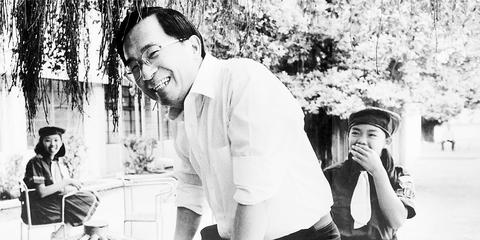
PHOTO COURTESY OF HAU KUANG-TSAI
TT: While he was Taipei mayor, President Chen took a series of steps as part of the "deconstructing authoritarianism" project, such as naming some city streets in Aboriginal languages, throwing a dance on the square in front of the Presidential Office and holding commemorative ceremonies for the 228 Incident. Now as president, is he trying to stand by these ideas?
Hau: A-bian's life is a perfect example of how one might climb to the top from the lowest station in society. He is the most suitable person to break down the taboos of the authoritarian era. When he starts doing it, the bureaucratic system will also follow suit.
Democracy is not just a procedure of allocating power. Rather, it should be a kind of culture. It takes the formation and accumulation of a kind of atmosphere, which is reflected in a politician's sense of humor and the people's sense of the accessibility of power.
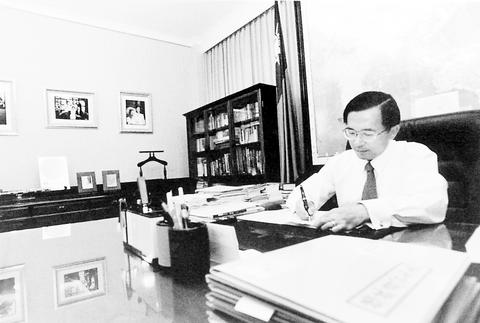
PHOTO COURTESY OF HAU KUANG-TSAI
For example, in the photo album you'll see things like the president's aides talking to him with their hands in their pockets, his only female secretary hanging up a banner to protest her excessive workload, children mocking the president when he is making a fool of himself, or even security guards cracking jokes right next to the president. These things could not have happened in the old, highly-disciplined era. And these changes are all records of the democratization process.
Besides, the government's departments and their subdivisions should be made accessible and available to the public. In the past, the official promotion materials or pamphlets were little more than propaganda, which was ineffective and a waste of money. This photo album is also intends to show all the government's departments that this is the way to open their door to the public.
TT: In the process of editing the album, you seem to have referred to similar publications of foreign politicians, such as those of the former US president Bill Clinton and Japanese Prime Minister Junichiro Koizumi.
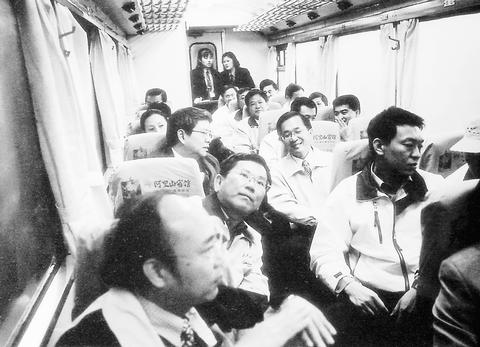
PHOTO COURTESY OF HAU KUANG-TSAI
Hau: In fact, I referred to not only politicians' photo albums but also to books featuring photos of the late Mother Teresa and the late Princess Diana. But comparing the photo albums of heads of state, Bill Clinton's album was a review of his eight-year presidency, while Koizumi's album was part of his campaign to target female voters. He dressed up and had his photos taken to compile the album. The nature of these two books is different from A-bian's photo album.
In A-bian's album, except for three occasions in which extra photographers were assigned to assist the Presidential Office's own photographer, all the shots were natural -- without props or sets.
What's important is that the book records the transformation of Taiwan's democratic culture in the last two years. With the president as the protagonist, the album is a part of historic literature and also the language in which the government communicates with the people.
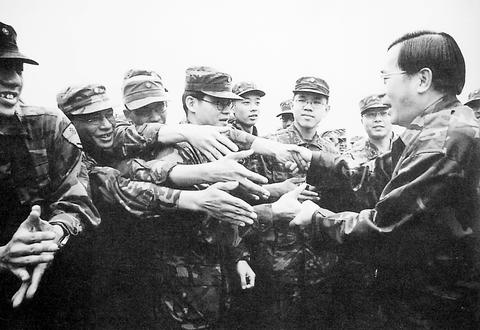
PHOTO COURTESY OF HAU KUANG-TSAI
TT: The photo album has drawn some criticism on political front. For instance, the opposition parties are asking how can the president devote so much time to showing off while the country is suffering from a lack of water. What's your view on this?
Hau: Democracy needs a sense of humor and the presentation of "diversified symbols." Politicians in Taiwan are still lacking creativity in this regard. All they do is cry, throw a temper tantrum and call each other names, while Western statesmen strive to show their voters how they can make fun of themselves and of their opponents in a humorous way.
Surely, having a humorous temperament, being natural and easy-going needs to go hand-in-hand with taste. One doesn't have to be like Yu Yueh-hsia (游月霞, a female KMT lawmaker), who showed her abdomen in front of the cameras to demonstrate that she had lost some weight. Similarly, many lawmakers do all they possibly can to seize attention from the media. Even though many lawmakers manage to turn themselves into headline-grabbers, the reporters report on these stories mainly because they despise these clowns and enjoy watching them embarrass themselves. This is a vicious circle, in which the public gets disgusted with politicians and the politicians think about nothing but putting themselves under the spotlight.
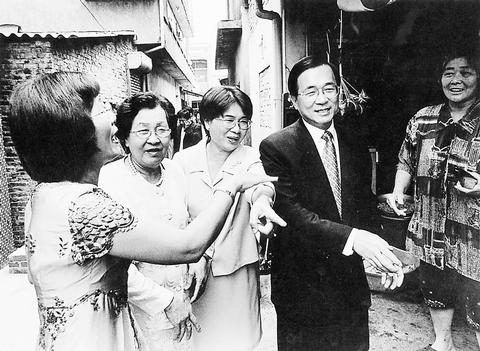
PHOTO COURTESY HAU KUANG-TSAI
Of course, we also need to take others' criticism, but I hope future criticism will be a bit more classy and humorous. Some opposition politicians criticized the book by saying that the president should not spare any time for such a project or by comparing the photo album to ones that feature nudity. I find these comments tasteless. It's like my youth during the martial law era, in which everything had to teach us something. For example, when writing compositions in schools, every student had to conclude their essays with a paragraph on eliminating the Communists no matter what the title of the essay was. There was all this talk about virtue, but the reality was totally inconsistent.
If everyone can respond to the album with a sense of humor, or even join our cause and make use of their creativity, then a democratic culture and atmosphere will be truly cultivated.
TT: The album is a selection of photos picked from nearly 20,000 photos taken at different occasions and functions. What are the themes of the stories that the album is trying to tell?
Hau: The content of the album is taken from the records of various activities that were taking place, such as the president having a meal with Vice President Annette Lu (呂秀蓮), former Premiers Tang Fei (唐飛), Chang Chun-hsiung (張俊雄) and Premier Yu Shyi-kun prior to a meeting on military affairs.
The photographers didn't -- and dared not -- ask anyone to pose in a certain way. We just told the president's photographer that we would be making a record from a new perspective, emphasizing a variety of social, environmental and educational activities in which the president participated and picked a few of the most lively and natural photos.
We discussed the theme of the album for a year. We tried to stress A-bian's hands because his hands have probably touched most people's hands in Taiwan. His hands are also considered to be full of warmth and energy.
And when A-bian went to sweep his ancestors' tombs on Tomb Sweeping Day, we didn't know that his classmates from elementary school had a reunion for him. And it turned out that we shot some film of the land and the people's hospitality. So we divided the themes into "one day in the hometown," "how the president spends his day," "one day in his president's residence" and "a special day."
The president has a very good memory. When discussing the photos, he often related the background information and the activities in which the photos were taken.

A preclearance service to facilitate entry for people traveling to select airports in Japan would be available from Thursday next week to Feb. 25 at Taiwan Taoyuan International Airport, Taoyuan International Airport Corp (TIAC) said on Tuesday. The service was first made available to Taiwanese travelers throughout the winter vacation of 2024 and during the Lunar New Year holiday. In addition to flights to the Japanese cities of Hakodate, Asahikawa, Akita, Sendai, Niigata, Okayama, Takamatsu, Kumamoto and Kagoshima, the service would be available to travelers to Kobe and Oita. The service can be accessed by passengers of 15 flight routes operated by

Chinese spouse and influencer Guan Guan’s (關關) residency permit has been revoked for repeatedly posting pro-China videos that threaten national security, the National Immigration Agency confirmed today. Guan Guan has said many controversial statements in her videos posted to Douyin (抖音), including “the red flag will soon be painted all over Taiwan” and “Taiwan is an inseparable part of China,” and expressing hope for expedited reunification. The agency last year received multiple reports alleging that Guan Guan had advocated for armed reunification. After verifying the reports, the agency last month issued a notice requiring her to appear and explain her actions. Guan

GIVE AND TAKE: Blood demand continues to rise each year, while fewer young donors are available due to the nation’s falling birthrate, a doctor said Blood donors can redeem points earned from donations to obtain limited edition Formosan black bear travel mugs, the Kaohsiung Blood Center said yesterday, as it announced a goal of stocking 20,000 units of blood prior to the Lunar New Year. The last month of the lunar year is National Blood Donation Month, when local centers seek to stockpile blood for use during the Lunar New Year holiday. The blood demand in southern Taiwan — including Tainan and Kaohsiung, as well as Chiayi, Pingtung, Penghu and Taitung counties — is about 2,000 units per day, the center said. The donation campaign aims to boost

The Central Weather Administration (CWA) said a magnitude 4.9 earthquake that struck off the coast of eastern Taiwan yesterday was an independent event and part of a stress-adjustment process. The earthquake occurred at 4:47pm, with its epicenter at sea about 45.4km south of Yilan County Hall at a depth of 5.9km, the CWA said. The quake's intensity, which gauges the actual effects of a temblor, was highest in several townships in Yilan and neighboring Hualien County, where it measured 4 on Taiwan's seven-tier intensity scale, the CWA said. Lin Po-yu (林柏佑), a division chief at the CWA's Seismological Center, told a news conference